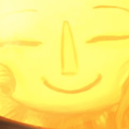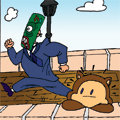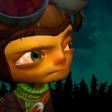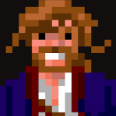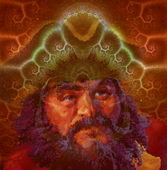Leaderboard
Popular Content
Showing content with the highest reputation on 05/05/22 in all areas
-
I somehow still hope that RMI explores the idea that Hell is under Monkey Island simply because that would mean that PIrate Doom is canon.6 points
-
I haven't forgotten the context. I know what you are saying, but what is the issue? Like, where is the harm in looking for/believing in "more than just funny joke"? I love doing exactly that, even if all the facts above point against it.5 points
-
There are two separate things being talked about here: the concept of "the secret of Monkey IslandTM " and the layers of reality in the two games. I think, like I said before, that the soMITM as discussed in the first game (and used as its title) was a generic adventure concept that covered the island's magical concealment and the monkey head portal etc. It feels to me like in that first game the post-modern stuff was purely for humour, but that in the second game they decided to roll it into the story. The Voodoo Lady says: "Big Whoop isn't just a treasure. It contains the secret to another world. Find that world and you'll be able to escape LeChuck forever." And then of course there's the fairground ending. Exactly how literally Gilbert et al intended this all to be taken is left fairly ambiguous, but they certainly intertwined it into the fabric of the story to some extent. To me, the fact that they created Big Whoop and connected it to the reality-bending, rather than returning to the location of Monkey Island and tying it all into that, supports the idea that the soMITM isn't that important and the continued questioning about it is a running joke. But you know what? The whole thing is intentionally ambiguous, and while we can all have our own theories about how important any given aspect is or what it means, there's no way to be sure unless Ron & Dave lay it all out for us in ReMI. Personally, I don't think they will - I suspect they'll answer a couple of things and ask five more!4 points
-
I'm pretty sure the Secret of Monkey Island is the title of the game, which was chosen because it sounds like a classic pirate adventure. When characters ask about it, it's a bit of fourth wall breaking with the trademark symbol and all, like the characters themselves saw the title screen. The developers were a bunch of irreverent dweeby programmers improvising jokes for eachother. Despite that, they stumbled upon a wonderfully evocative atmosphere, and managed to thread the needle into a sort of sarcastic mystique.3 points
-
2 points
-
Yep! I was literally reading contemporary reviews last night, so it's all very fresh in my mind. It was, just as you say, extremely interesting! I'll pull out some of the quotes I read while I can still remember them.2 points
-
Not sure if you've seen this already, but this is a good site: http://amr.abime.net/amr_search.php?search=The+Secret+of+Monkey+Island&mag_id=0&action=Find2 points
-
Yes, I don't think everyone has forgotten the context at all. I was there. Sure, I was ten, but I was there, I remember what video games were like and I remember the exact moment I first saw Monkey Island and realised it was different to other things I'd seen. But I actually think that it cheapens things somewhat to assert that just because they started out throwing things in just because they found them funny or weird or for no particular reason at all, that's how they continued thinking about it and that's the context in which we ought to think about it. As someone who has made a couple of games, as I understand it the creative process often goes something like this: you start out by chucking some ideas out. After a while you start to notice how certain ideas within it relate to each other and strengthen each other and those ideas coalesce into larger ideas, which themselves create other ideas, and this process is what makes a piece of work cohere, feel like a piece of work rather than a loose jumble of ideas. Sure, it might be rock and roll, but this happens in rock and roll too. Because for all they were just throwing out ideas, they were also playing by rules. There's an internal logic to the game that only gets broken in specific ways, and even the ways in which it breaks its own rules are kind of its own bit of internal logic. They might not have verbalised it or given it a name or consciously understood every bit of it, but Monkey Island has a specific sort of language it talks, and you can tell when it's it, and when it isn't it - just like you can tell when something is and isn't rock and roll. So I think when people enthusiastically talk about things like the secret, and clues, and deep lore, they're not necessarily talking about stuff that was written in a design doc or carved in stone or whatever. They're just suggesting that by the end of MI2, the creators at least SEEMED to have a notion of what all these nuggets had coalesced into, and speculating on the explanation that best fits what's there.2 points
-
This. A thousand times this. Everyone has forgotten the context. Back in 1990, most adventure games were Fantasy (with a capital F) and they took themselves seriously. VERY seriously. They were mostly dour, dry and humourless. They were unable to laugh at themselves. (They were also unforgiving. (Didn't pick up the red berry on the first screen? Tough luck, you needed that to beat the big bad in the final scene. Now you have to start over.) And often impenetrable: 'Oops, you used the wrong verb. You needed to "hurl" the axe, not "throw" it. Game over.') The Secret of Monkey Island was a reaction to all of that. It's why it made such a dent in the videogame landscape. It was a glorious breath of fresh air! It was FUN. It was FUNNY. It didn't take itself too seriously. It was accessible and forgiving. All the fourth wall busting jokes, the silly anachronisms, they were just a reaction to contemporary adventure games. The whole genre was ripe for someone popping its pomposity. Hell, the whole industry needed some humour injecting into it. If you go back and read contemporary reviews, there was often comments about the lack of humour in video games. And even debates as to why that was. Monkey Island was an oddity: a genuinely funny video game. But now we're examining it through the prism of today's video games: As if humour was everywhere. As if there was some master plan with the jokes they selected. As if they said, "let's change this joke to an anachronistic one to hint to the user that this is all a fantasy". Everything they did was because it made the developers laugh. That was already rock and roll in itself. Not one contemporary review made mention of the anachronisms because those sort of jokes are staples of broad comedy -- especially comedy set in historical times. I think you'd be hard pressed to find a single comedy movie that was set in historical times that didn't feature at least one anachronistic joke. (And if you did, it would be the exception that proved the rule.) Here's a list: https://tvtropes.org/pmwiki/pmwiki.php/AnachronismStew/FilmsUsingRuleOfFunny2 points
-
This is exactly what I mean! That’s some next level David Lynch unraveling for something that might just be a solution to a technical problem! Love it!2 points
-
Yes, well put! I often jump between looking at the mystery of Monkey Island through the narrative and the developer POV. The latter is where my head got stuck the most, where I try to rationalize my MI world view with the writer’s intention. Worst result is feeling dumb for believing a scene points at something bigger, when there are many parts of the first two games that were “”just”” stream of conscious goofy-ness.* The more I do that the more fun it sucks out of speculation, as if I’m looking for confirmation to see Monkey Island in a certain way. But that sucks, doesn’t it? What a killjoy voice in my head. But don’t get me wrong, I don’t want to dismiss the developers angle at all. I love analyzing the most minor things in writers interviews to discover more about their intentions! A healthy balance of the 2 views is probably the best, I think. And is, to me, the main reason we talk about these games still today. I love it! *Look, I know, painting LeChucks coat blue in the nightmare scene of Monkey 2 is a way to make him stand out from the super red background. But what if, what if, it was a choice to paint him as a mirror to Guybrush, who also wears a blue coat. He also turns into Guybrush seconds later! What does that mean? A hint of “We are bound to one another”? Them being brothers?? Could be! Or not! Whatever, I LOVE these speculations.2 points
-
I think taken individually you could say these bits were just their sense of humour. But it's not just that. It's the particular way they employ anachronisms, the series of jokes which, taken individually seem like they're just goofy but taken together seem to add up to a bit more than that because they're all pulling in a certain direction. (the t shirts, the way the pirates say things like 'Have Fun on Melee Island', the way a bunch of stuff is trademarked, the reference to pirate lingo being 'how they talked back then', the way the melee island treasure is described on its sign, the references the voodoo lady makes to discovering things about yourself and your world that never seem to get addressed in the first game) Now, even if these and more had all been just random goofs they clearly later decided there was enough meat on those bones to turn it into a whole surprise ending for MI2, and I don't know... I don't care how goofy you think your pirate game is, I don't think that you choose to end it that way just as a gag. But in the end I suppose it doesn't really matter if the ending of MI2 was something they'd had an idea about early on in the design of MI, or whether it came late, or whether it emerged gradually from things that started out as jokes. The important thing is that there's enough in both games for it to FEEL like this is where things were going all along, enough that we can genuinely speculate on it.2 points
-
Sure, but there's a difference between remembering the file extension to a DPaint brush and remembering the details of exactly in what order and how a plot point that might have changed back and forth several times during production came together. I can barely remember the meandering conversations I had about the plots of my game ideas last month. But I remember the music files I made on the amiga were .mod1 point
-
I also think, as has been said before, what was fooling around in Monkey Island 1 (fooling around with jokes, but also with being creepy and evocative for no real purpose other than it felt right) got codified into the text of 2 in a way that retroactively tints how those moments play in 1. That too was surely a deliberate choice by the team who made 2. Walking out of the elevator from the underground tunnels into Melee Island is a deliberate act of recontextualization that isn’t just one guy cracking another guy up. And it’s not something that would be written about in a review of Monkey Island 1. I don’t think anyone is arguing that there is any grand and perfect plan - it’s clear these games are built on top of each other, with each choice being an intuitive response to the choice that came before, done at the time in real time (the first two games came together in under two years!). Like much of Monkey Island discussion, I think everyone is right here. There probably is no true right or wrong, at least within the band of conversation that’s been happening in this specific thread, which is by and large a really good one.1 point
-
This is a striking assertion. Are you basing this on your memory from 30 years ago or do you know a good resource for such contemporary reviews? Specifically, I mean. I don’t fancy trawling through massive magazine archives. I ask the question earnestly because I think I’d enjoy reading what people at the time thought of these games. I certainly enjoyed the Atari magazine scans we recently unearthed.1 point
-
It’s actually great that we can’t really distinguish the humour from the lore, because they’re so intertwined! It’s fascinating that we’re still talking about some ominous ‘secret’ 30 years later, and hanging on to dialogue that might’ve been a funny placeholder! It’s one of those alignment of the stars things that just makes it work and keeps it interesting! And it’s what I LOVE about Monkey Island! 😁1 point
-
I've heard a lot of people say similar things about that line over the years, but honestly it's never struck me as anything but a joke about the characters in the game being played by "actors," a la the outtakes Pixar used to include in all their end-credits. The guy is overcommitting to his accent and Guybrush has to ask him what he just said, and he's ticked off because he doesn't want to have to do another take. I've always figured it was one of the "placeholder" jokes that Schafer and Grossman included to amuse themselves that wound up in the final game.1 point
-
Definitely agree, hope the overall mysterious atmosphere is kept and the anachronisms and the weird bits are never fully explained at all. It's part of what makes Monkey Island so amazing.1 point
-
And I hope Return will have more of these little bits of mystery, and not explain or answer them. 😊1 point
-
In support of that would be this excerpt from "The Memoirs of Guybrush Threepwood: The Monkey Island Years" Now the Canon status of a POV walkthrough written by 2 third parties, while official, could certainly be dubious but hey, it had to be signed off by someone before it hit the box I imagine 😀1 point
-
1 point





